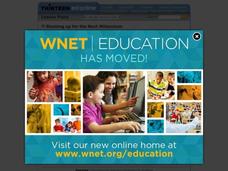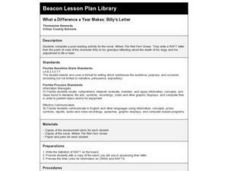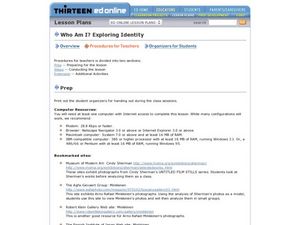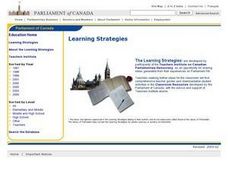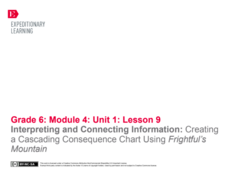Curated OER
Self-Assessment: Habits of Effective Readers, Writers, Speakers, Listeners, and Viewers
Fifth graders study how to read fluently. In this reading lesson, 5th graders practice reading and recording any miscues. Students time each other and graph their progress each day.
Curated OER
What's For Dinner?
Learners share their own views on eating genetically altered foods. After reading an article, they research any issues concerning these types of foods in the United States. In groups, they create a campaign slogan to help gain funding...
Curated OER
Heaven or Ground Hog Day?
Students discover the ideas of enlightenment by reading historical poetry. In this philosophical lesson, students read poems by Sir Walter Scott and Sergeant Joyce Kilmer while discussing the themes of the writing with classmates....
Curated OER
The Game of Persuasion
Learners study vocabulary words and explore persuasive speaking. In groups, they support a given argument and generate ideas for a a persuasive speech. They discuss powerful words and strategies for persuasion. Students write a...
Curated OER
Stocking Up For The Next Millennium
Look back on the inventions, concepts, cultural items, and literary contributions of the past one hundred years. Young historians will compose a presentation based on the research they do in favor of one thing that should withstand the...
Curated OER
Exploring Satire - Jonathan Swift
Students study about satire and find examples Part One of GULLIVER'S TRAVELS. They then write an essay about the examples they found and how the writer used satire in his literary work.
Curated OER
Shakespeare's Othello and the Power of Language
Learners explore the basis of Iago's persuasive power by analyzing Shakespeare's use of rhetoric and figurative language. In this Othello lesson, students analyze Iago's rhetoric in monologues and dialogues with other characters....
Curated OER
What a Difference a Year Makes: Billy's Letter
Seventh graders read, "Where the Red Fern Grows" and write a RAFT letter from the point of view of the character Billy to his grandpa reflecting on the death of his dog and his adjustment to life in town.
Curated OER
Build Your Own Adventure
Sixth graders write a narrative. They choose options for plot and climax within the context of an outdoor survival story.
Curated OER
Exploring Color Vocabulary
Students explore color terms and related meanings and metaphors in cultural and literary contexts. They use the main colors to explore synonymous color terms and related metaphorical meanings of color words. Students recognize the...
Curated OER
Who Am I? Exploring Identity
Students define identity, consider who they are/what they value, explore the work of two photographers featured on an upcoming episode of EGG THE ARTS SHOW to see how they have dealt with the issue of identity, and respond using...
Curated OER
Living Biographies
Third graders create a multimedia slide presentation containing facts, graphics, and sounds relating to a biographical figure based on their reading of a biography or an autobiography. They present their slide presentations before the...
Curated OER
Susan B. Anthony and the 19th Amendment
Young scholars take a closer look at the Women's Suffrage Movement in America. In this women's rights lesson, students research suffrage leaders and write papers about them. Young scholars then read and discuss information...
Curated OER
Critical Literacy in the 21st Century
Young scholars discover world geography by writing persuasive letters. In this literacy lesson, students discuss what percentage of children are illiterate in our country compared to other geographic locations. Young scholars...
Curated OER
Pros and Cons of Hydroelectric Power
Students develop arguments for and against the construction of hydroelectric power plants. Poll the groups to determine which view dominates in the class and students write a summary of their conclusions.
Curated OER
It's Debatable!
Students examine the basic elements and vocabulary of debating. They research an issue and write a letter to the editor of the local newspaper, and role-play a Parliamentary debate on a particular bill.
English Enhanced Scope and Sequence
Identifying Persuasion in Media Literacy
As part of a study of media literacy, groups examine advertisements from Money, Fortune, The New Yorker, or Good Housekeeping and identify the types of rhetorical appeals used in the ads. After groups present their findings, the whole...
EngageNY
Interpreting and Connecting Information: Creating a Cascading Consequence Chart Using Frightful’s Mountain
Decisions, decisions. Scholars take a close look at making decisions by discussing the character Sam in chapters one through eight of Frightful’s Mountain. Partners discuss whether Sam should interact with Frightful and then...
Curated OER
Language Arts: The Three Appeals
Students are able to identify and describe the persuasive techniques used in editorial writing. They are able to label persuasive techniques with the logos, pathos, and ethos terminology.
Curated OER
Heritage: Seeking Land or Gold
Learners write a persuasive letter home defending their decision either to settle in Utah and farm the land, or to go on to California to seek gold. They analyze a problem, make a decision, and write a letter defending their choice.
Curated OER
Those Before Us
Learners examine medical pioneers and identify their characteristics. They survey their contributions to the medical field and society and present persuasive argument for or against modern medical pioneers.
Curated OER
Indian Removal Act
Students use the Internet to research the Indian Removal Act and write a journalistic article showcasing their findings. They choose from a variety of viewpoints and topics to narrow their focus.
Curated OER
Religion: Great Schism Debate
Young scholars examine the Great Schism in the Roman Catholic Church and research the positions of the three popes. The three groups research their popes' positions and then hold a debate. Students write position papers about the Great...
Curated OER
Fiction vs. Nonfiction
Students explore fiction and nonfiction writing. They identify the elements of fiction in a short story and identify the criteria necessary in a nonfiction piece. Students distinguish the author's purpose in an expository text,...




